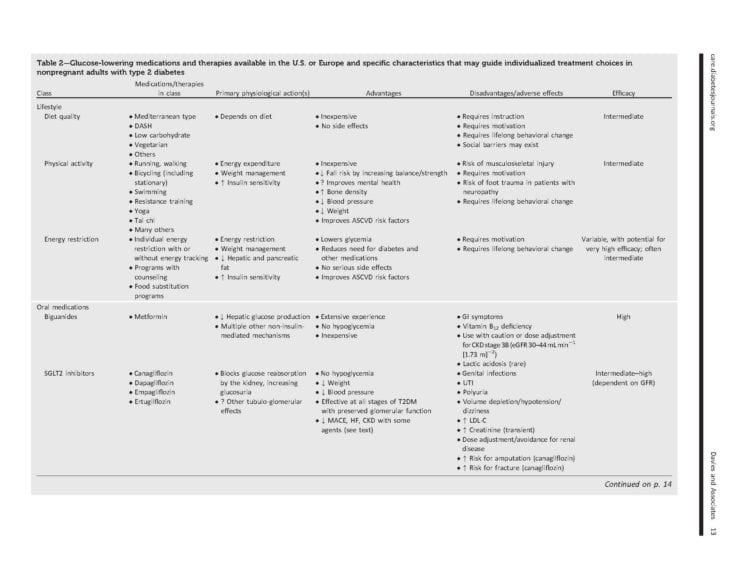The American Diabetes Association (ADA) & the European Association for the Study of Diabetes (EASD) have just released their new joint position statement which includes approval of low-carbohydrate diets for use in the management of Type 2 Diabetes (T2D) in adults. This comes on the heels of Diabetes Australia having recently released an updated position statement in August titled Low Carbohydrate Eating for People with Diabetes (you can read more about that here).
This is huge!
By releasing this updated joint position statement, the American Diabetes Association (ADA) and the European Association for the Study of Diabetes (EASD) indicate that they now recognize a low-carbohydrate diet as a safe and effective lifestyle management of T2D in adults.
In the newly released joint position statement that was published online ahead of print on October 4, 2018, in the journal Diabetes Care, it was stated that the new recommendations were based on “a systematic evaluation of the literature since 2014” [1]. That is, approval for the use of low-carbohydrate diets is based on current research.
A Full Range of Therapeutic Options
The new joint ADA & EASD position statement endorses “a full range of therapeutic options” including lifestyle management, medication, and obesity management, and indicates that:
“An individual program of Medical Nutrition Therapy (MNT) should be offered to all patients”.
The new joint position statement elaborates that Medical Nutrition Therapy (MNT) is made up of an education component and a support component to enable patients to adopt healthy eating patterns with the goal of “managing blood glucose and cardiovascular risk factors”. The goal is to reduce risk for Diabetes-related complications while preserving the pleasure of eating, with the two basic dimensions of MNT including diet quality and energy restriction.
Diet Quality and Eating Patterns
The joint American and European position paper on the management of T2D states clearly;
“There is no single ratio of carbohydrate, proteins and fat intake that is optimal for every person with Type 2 Diabetes.”
but
“Instead, there are many good options and professional guidelines usually recommend individually selected eating patterns that emphasize foods of demonstrated health benefit, that minimize foods of demonstrated harm and that accommodate patient preference and metabolic needs, with the goal of identifying healthy dietary habits that are feasible and sustainable.”
Included in this category are;
- The Mediterranean Diet
- The Dietary Approaches to Stop Hypertension (DASH) Diet
- Low Carbohydrate Diets
- Vegetarian Diets
The joint position paper noted that;
“Low-carbohydrate diets (<26% of total energy) produce substantial reductions in HbA1c at 3 months and 6 months with diminishing effects at 12 and 24 months.”
Unfortunately, the paper failed to note that the one-year Virta study data reported that HbA1C continued to decline at one year, but yes, at diminished rates.
The new joint ADA and European Association for the Study of Diabetes also noted that moderate carbohydrate restriction was of no benefit.
“no benefit of moderate carbohydrate restriction (26—45%) was observed.”
The paper acknowledged that there are many different types of “low-carbohydrate diets’ and the particular benefits of a low-carbohydrate Mediterranean eating pattern were in reducing the requirement for medication over 4 years;
“people with new-onset Diabetes assigned to a low carbohydrate Mediterranean eating pattern were 37% less likely to require glucose-lowering medications over 4 years compared with patients assigned to a low-fat diet”.
The paper outlines that the primary physiological actions depend on which diet is followed.
It lists advantages of using diet, including a low-carbohydrate diet in the management of type 2 diabetes symptoms in adults is that dietary changes are inexpensive and have no side effects.

Disadvantages of using diet, including a low-carbohydrate diet in the management of T2D symptoms in adults, are that it requires instruction, motivation, lifelong behaviour change, and may pose some social barriers.
Yes, a well-designed low-carbohydrate diet does require instruction, but for those who have the motivation to avoid the chronic health complications of Diabetes through diet and who are committed to maintaining the behaviour change.
More Info
If you would like more information, you can learn about me here.
To your good health!
Joy
You can follow me on:
Twitter: https://twitter.com/jyerdile
Facebook: https://www.facebook.com/BetterByDesignNutrition/
Copyright ©2018 BetterByDesign Nutrition Ltd.
LEGAL NOTICE: The contents of this blog, including text, images and cited statistics as well as all other material contained here (the ”content”) are for information purposes only. The content is not intended to be a substitute for professional advice, medical diagnosis and/or treatment and is not suitable for self-administration without the knowledge of your physician and regular monitoring by your physician. Do not disregard medical advice and always consult your physician with any questions you may have regarding a medical condition or before implementing anything you have read or heard in our content.
References
- Davies M.J., D’Alessio D.A., Fradkin J., et al, Management of Hyperglycemia
in Type 2 Diabetes, 2018. A Consensus Report by the American Diabetes Association (ADA) and the European Association for the Study of Diabetes (EASD), Diabetes Care, October 2018, https://doi.org/10.2337/dci18-0033. Click here for pdf of the full article (on an affiliate web page). - Diabetes Australia, Low Carbohydrate Eating for People with Diabetes — Position Statement, August 2018, https://www.diabetesqld.org.au/media-centre/2018/august/low-carb-position-statement.aspx and https://www.diabetesqld.org.au/media/583017/da-low-carb-statement-21-august-2018.pdf
- Hallberg, S.J., McKenzie, A.L., Williams, P.T. et al. Diabetes Ther (2018). Effectiveness and Safety of a Novel Care Model for the Management of Type 2 Diabetes at 1 Year: An Open-Label, Non-Randomized, Controlled Study. https://doi.org/10.1007/s13300-018-0373-9

Joy is a Registered Dietitian Nutritionist and owner of BetterByDesign Nutrition Ltd. She has a postgraduate degree in Human Nutrition, is a published mental health nutrition researcher, and has been supporting clients’ needs since 2008. Joy is licensed in BC, Alberta, and Ontario, and her areas of expertise range from routine health, chronic disease management, and digestive health to therapeutic diets. Joy is passionate about helping people feel better and believes that Nutrition is BetterByDesign©.
